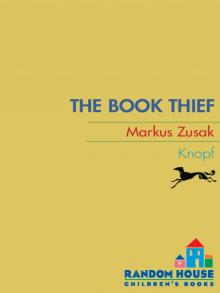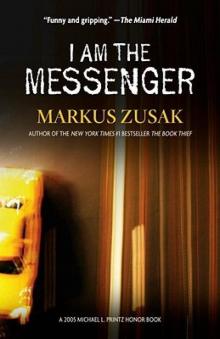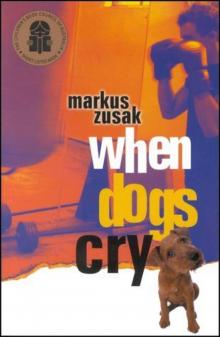- Home
- Markus Zusak
The Book Thief Page 9
The Book Thief Read online
Page 9
The orange flames waved at the crowd as paper and print dissolved inside them. Burning words were torn from their sentences.
On the other side, beyond the blurry heat, it was possible to see the brownshirts and swastikas joining hands. You didn’t see people. Only uniforms and signs.
Birds above did laps.
They circled, somehow attracted to the glow—until they came too close to the heat. Or was it the humans? Certainly, the heat was nothing.
In her attempt to escape, a voice found her.
“Liesel!”
It made its way through and she recognized it. It was not Rudy, but she knew that voice.
She twisted free and found the face attached to it. Oh, no. Ludwig Schmeikl. He did not, as she expected, sneer or joke or make any conversation at all. All he was able to do was pull her toward him and motion to his ankle. It had been crushed among the excitement and was bleeding dark and ominous through his sock. His face wore a helpless expression beneath his tangled blond hair. An animal. Not a deer in lights. Nothing so typical or specific. He was just an animal, hurt among the melee of its own kind, soon to be trampled by it.
Somehow, she helped him up and dragged him toward the back. Fresh air.
They staggered to the steps at the side of the church. There was some room there and they rested, both relieved.
Breath collapsed from Schmeikl’s mouth. It slipped down, over his throat. He managed to speak.
Sitting down, he held his ankle and found Liesel Meminger’s face. “Thanks,” he said, to her mouth rather than her eyes. More slabs of breath. “And …” They both watched images of school-yard antics, followed by a school-yard beating. “I’m sorry—for, you know.”
Liesel heard it again.
Kommunisten.
She chose, however, to focus on Ludwig Schmeikl. “Me too.”
They both concentrated on breathing then, for there was nothing more to do or say. Their business had come to an end.
The blood enlarged on Ludwig Schmeikl’s ankle.
A single word leaned against the girl.
To their left, flames and burning books were cheered like heroes.
THE GATES OF THIEVERY
She remained on the steps, waiting for Papa, watching the stray ash and the corpse of collected books. Everything was sad. Orange and red embers looked like rejected candy, and most of the crowd had vanished. She’d seen Frau Diller leave (very satisfied) and Pfiffikus (white hair, a Nazi uniform, the same dilapidated shoes, and a triumphant whistle). Now there was nothing but cleaning up, and soon, no one would even imagine it had happened.
But you could smell it.
“What are you doing?”
Hans Hubermann arrived at the church steps.
“Hi, Papa.”
“You were supposed to be in front of the town hall.”
“Sorry, Papa.”
He sat down next to her, halving his tallness on the concrete and taking a piece of Liesel’s hair. His fingers adjusted it gently behind her ear. “Liesel, what’s wrong?”
For a while, she said nothing. She was making calculations, despite already knowing. An eleven-year-old girl is many things, but she is not stupid.
A SMALL ADDITION
The word communist + a large bonfire + a collection of dead letters + the suffering of her mother + the death of her brother = the Führer
The Führer.
He was the they that Hans and Rosa Hubermann were talking about that evening when she first wrote to her mother. She knew it, but she had to ask.
“Is my mother a communist?” Staring. Straight ahead. “They were always asking her things, before I came here.”
Hans edged forward a little, forming the beginnings of a lie. “I have no idea—I never met her.”
“Did the Führer take her away?”
The question surprised them both, and it forced Papa to stand up. He looked at the brown-shirted men taking to the pile of ash with shovels. He could hear them hacking into it. Another lie was growing in his mouth, but he found it impossible to let it out. He said, “I think he might have, yes.”
“I knew it.” The words were thrown at the steps and Liesel could feel the slush of anger, stirring hotly in her stomach. “I hate the Führer,” she said. “I hate him.”
And Hans Hubermann?
What did he do?
What did he say?
Did he bend down and embrace his foster daughter, as he wanted to? Did he tell her that he was sorry for what was happening to her, to her mother, for what had happened to her brother?
Not exactly.
He clenched his eyes. Then opened them. He slapped Liesel Meminger squarely in the face.
“Don’t ever say that!” His voice was quiet, but sharp.
As the girl shook and sagged on the steps, he sat next to her and held his face in his hands. It would be easy to say that he was just a tall man sitting poor-postured and shattered on some church steps, but he wasn’t. At the time, Liesel had no idea that her foster father, Hans Hubermann, was contemplating one of the most dangerous dilemmas a German citizen could face. Not only that, he’d been facing it for close to a year.
“Papa?”
The surprise in her voice rushed her, but it also rendered her useless. She wanted to run, but she couldn’t. She could take a Watschen from nuns and Rosas, but it hurt so much more from Papa. The hands were gone from Papa’s face now and he found the resolve to speak again.
“You can say that in our house,” he said, looking gravely at Liesel’s cheek. “But you never say it on the street, at school, at the BDM, never!” He stood in front of her and lifted her by the triceps. He shook her. “Do you hear me?”
With her eyes trapped wide open, Liesel nodded her compliance.
It was, in fact, a rehearsal for a future lecture, when all of Hans Hubermann’s worst fears arrived on Himmel Street later that year, in the early hours of a November morning.
“Good.” He placed her back down. “Now, let us try …” At the bottom of the steps, Papa stood erect and cocked his arm. Forty-five degrees. “Heil Hitler.”
Liesel stood up and also raised her arm. With absolute misery, she repeated it. “Heil Hitler.” It was quite a sight—an eleven-year-old girl, trying not to cry on the church steps, saluting the Führer as the voices over Papa’s shoulder chopped and beat at the dark shape in the background.
“Are we still friends?”
Perhaps a quarter of an hour later, Papa held a cigarette olive branch in his palm—the paper and tobacco he’d just received. Without a word, Liesel reached gloomily across and proceeded to roll it.
For quite a while, they sat there together.
Smoke climbed over Papa’s shoulder.
After another ten minutes, the gates of thievery would open just a crack, and Liesel Meminger would widen them a little further and squeeze through.
TWO QUESTIONS
Would the gates shut behind her?
Or would they have the goodwill to let her back out?
As Liesel would discover, a good thief requires many things.
Stealth. Nerve. Speed.
More important than any of those things, however, was one final requirement.
Luck.
Actually.
Forget the ten minutes.
The gates open now.
BOOK OF FIRE
The dark came in pieces, and with the cigarette brought to an end, Liesel and Hans Hubermann began to walk home. To get out of the square, they would walk past the bonfire site and through a small side road onto Munich Street. They didn’t make it that far.
A middle-aged carpenter named Wolfgang Edel called out. He’d built the platforms for the Nazi big shots to stand on during the fire and he was in the process now of pulling them down. “Hans Hubermann?” He had long sideburns that pointed to his mouth and a dark voice. “Hansi!”
“Hey, Wolfal,” Hans replied. There was an introduction to the girl and a “heil Hitler.” “Good, Liesel.�
�
For the first few minutes, Liesel stayed within a five-meter radius of the conversation. Fragments came past her, but she didn’t pay too much attention.
“Getting much work?”
“No, it’s all tighter now. You know how it is, especially when you’re not a member.”
“You told me you were joining, Hansi.”
“I tried, but I made a mistake—I think they’re still considering.”
• • •
Liesel wandered toward the mountain of ash. It sat like a magnet, like a freak. Irresistible to the eyes, similar to the road of yellow stars.
As with her previous urge to see the mound’s ignition, she could not look away. All alone, she didn’t have the discipline to keep a safe distance. It sucked her toward it and she began to make her way around.
Above her, the sky was completing its routine of darkening, but far away, over the mountain’s shoulder, there was a dull trace of light.
“Pass auf, Kind,” a uniform said to her at one point. “Look out, child,” as he shoveled some more ash onto a cart.
Closer to the town hall, under a light, some shadows stood and talked, most likely exulting in the success of the fire. From Liesel’s position, their voices were only sounds. Not words at all.
For a few minutes, she watched the men shoveling up the pile, at first making it smaller at the sides to allow more of it to collapse. They came back and forth from a truck, and after three return trips, when the heap was reduced near the bottom, a small section of living material slipped from inside the ash.
THE MATERIAL
Half a red flag, two posters advertising a Jewish poet, three books, and a wooden sign with something written on it in Hebrew
Perhaps they were damp. Perhaps the fire didn’t burn long enough to fully reach the depth where they sat. Whatever the reason, they were huddled among the ashes, shaken. Survivors.
“Three books.” Liesel spoke softly and she looked at the backs of the men.
“Come on,” said one of them. “Hurry up, will you, I’m starving.”
They moved toward the truck.
The threesome of books poked their noses out.
Liesel moved in.
The heat was still strong enough to warm her when she stood at the foot of the ash heap. When she reached her hand in, she was bitten, but on the second attempt, she made sure she was fast enough. She latched onto the closest of the books. It was hot, but it was also wet, burned only at the edges, but otherwise unhurt.
It was blue.
The cover felt like it was woven with hundreds of tightly drawn strings and clamped down. Red letters were pressed into those fibers. The only word Liesel had time to read was Shoulder. There wasn’t enough time for the rest, and there was a problem. The smoke.
Smoke lifted from the cover as she juggled it and hurried away. Her head was pulled down, and the sick beauty of nerves proved more ghastly with each stride. There were fourteen steps till the voice.
It propped itself up behind her.
“Hey!”
That was when she nearly ran back and tossed the book onto the mound, but she was unable. The only movement at her disposal was the act of turning.
“There are some things here that didn’t burn!” It was one of the cleanup men. He was not facing the girl, but rather, the people standing by the town hall.
“Well, burn them again!” came the reply. “And watch them burn!”
“I think they’re wet!”
“Jesus, Mary, and Joseph, do I have to do everything myself?” The sound of footsteps passed by. It was the mayor, wearing a black coat over his Nazi uniform. He didn’t notice the girl who stood absolutely still only a short distance away.
A REALIZATION
A statue of the book thief stood in the courtyard….
It’s very rare, don’t you think, for a statue to appear before its subject has become famous.
She sank.
The thrill of being ignored!
The book felt cool enough now to slip inside her uniform. At first, it was nice and warm against her chest. As she began walking, though, it began to heat up again.
By the time she made it back to Papa and Wolfgang Edel, the book was starting to burn her. It seemed to be igniting.
Both men looked at her.
She smiled.
Immediately, when the smile shrank from her lips, she could feel something else. Or more to the point, someone else. There was no mistaking the watched feeling. It was all over her, and it was confirmed when she dared to face the shadows over at the town hall. To the side of the collection of silhouettes, another one stood, a few meters removed, and Liesel realized two things.
A FEW SMALL PIECES
OF RECOGNITION
1. The shadow’s identity and
2. The fact that it had seen everything
The shadow’s hands were in its coat pockets.
It had fluffy hair.
If it had a face, the expression on it would have been one of injury.
“Gottverdammt,” Liesel said, only loud enough for herself. “Goddamn it.”
“Are we ready to go?”
In the previous moments of stupendous danger, Papa had said goodbye to Wolfgang Edel and was ready to accompany Liesel home.
“Ready,” she answered.
They began to leave the scene of the crime, and the book was well and truly burning her now. The Shoulder Shrug had applied itself to her rib cage.
As they walked past the precarious town hall shadows, the book thief winced.
“What’s wrong?” Papa asked.
“Nothing.”
Quite a few things, however, were most definitely wrong:
Smoke was rising out of Liesel’s collar.
A necklace of sweat had formed around her throat.
Beneath her shirt, a book was eating her up.
PART THREE
mein kampf
featuring:
the way home—a broken woman—a struggler—
a juggler—the attributes of summer—
an aryan shopkeeper—a snorer—two tricksters—
and revenge in the shape of mixed candy
THE WAY HOME
Mein Kampf.
The book penned by the Führer himself.
It was the third book of great importance to reach Liesel Meminger; only this time, she did not steal it. The book showed up at 33 Himmel Street perhaps an hour after Liesel had drifted back to sleep from her obligatory nightmare.
Some would say it was a miracle that she ever owned that book at all.
Its journey began on the way home, the night of the fire.
They were nearly halfway back to Himmel Street when Liesel could no longer take it. She bent over and removed the smoking book, allowing it to hop sheepishly from hand to hand.
When it had cooled sufficiently, they both watched it a moment, waiting for the words.
Papa: “What the hell do you call that?”
He reached over and grabbed hold of The Shoulder Shrug. No explanation was required. It was obvious that the girl had stolen it from the fire. The book was hot and wet, blue and red—embarrassed—and Hans Hubermann opened it up. Pages thirty-eight and thirty-nine. “Another one?”
Liesel rubbed her ribs.
Yes.
Another one.
“Looks like,” Papa suggested, “I don’t need to trade any more cigarettes, do I? Not when you’re stealing these things as fast as I can buy them.”
Liesel, by comparison, did not speak. Perhaps it was her first realization that criminality spoke best for itself. Irrefutable.
Papa studied the title, probably wondering exactly what kind of threat this book posed to the hearts and minds of the German people. He handed it back. Something happened.
“Jesus, Mary, and Joseph.” Each word fell away at its edges. It broke off and formed the next.
The criminal could no longer resist. “What, Papa? What is it?”
“O
f course.”
Like most humans in the grip of revelation, Hans Hubermann stood with a certain numbness. The next words would either be shouted or would not make it past his teeth. Also, they would most likely be a repetition of the last thing he’d said, only moments earlier.
“Of course.”
This time, his voice was like a fist, freshly banged on the table.
The man was seeing something. He was watching it quickly, end to end, like a race, but it was too high and too far away for Liesel to see. She begged him. “Come on, Papa, what is it?” She fretted that he would tell Mama about the book. As humans do, this was all about her. “Are you going to tell?”
“Sorry?”
“You know. Are you going to tell Mama?”
Hans Hubermann still watched, tall and distant. “About what?”
She raised the book. “This.” She brandished it in the air, as if waving a gun.
Papa was bewildered. “Why would I?”
She hated questions like that. They forced her to admit an ugly truth, to reveal her own filthy, thieving nature. “Because I stole again.”
Papa bent himself to a crouching position, then rose and placed his hand on her head. He stroked her hair with his rough, long fingers and said, “Of course not, Liesel. You are safe.”
“So what are you going to do?”
That was the question.
What marvelous act was Hans Hubermann about to produce from the thin Munich Street air?
Before I show you, I think we should first take a look at what he was seeing prior to his decision.
PAPA’S FAST-PACED VISIONS
First, he sees the girl’s books: The Grave Digger’s Handbook, Faust the Dog, The Lighthouse, and now The Shoulder Shrug. Next is a kitchen and a volatile Hans Junior, regarding those books on the table, where the girl often reads. He speaks: “And what trash is this girl reading?” His son repeats the question three times, after which he makes his suggestion for more appropriate reading material.

 The Book Thief
The Book Thief I Am the Messenger
I Am the Messenger When Dogs Cry
When Dogs Cry Underdogs
Underdogs Underdogs: Three Novels
Underdogs: Three Novels Bridge of Clay
Bridge of Clay